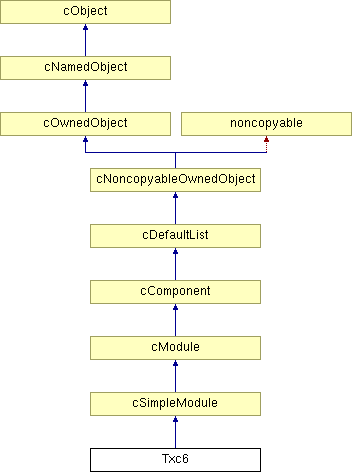Txc6 Class Reference

Public Member Functions | |
| Txc6 () | |
| virtual | ~Txc6 () |
Protected Member Functions | |
| virtual void | initialize () |
| virtual void | handleMessage (cMessage *msg) |
Private Attributes | |
| cMessage * | event |
| cMessage * | tictocMsg |
Detailed Description
In the previous models, `tic' and `toc' immediately sent back the received message. Here we'll add some timing: tic and toc will hold the message for 1 simulated second before sending it back. In OMNeT++ such timing is achieved by the module sending a message to itself. Such messages are called self-messages (but only because of the way they are used, otherwise they are completely ordinary messages) or events. Self-messages can be "sent" with the scheduleAt() function, and you can specify when they should arrive back at the module.
We leave out the counter, to keep the source code small.
Constructor & Destructor Documentation
| Txc6::Txc6 | ( | ) |
00045 { 00046 // Set the pointer to NULL, so that the destructor won't crash 00047 // even if initialize() doesn't get called because of a runtime 00048 // error or user cancellation during the startup process. 00049 event = tictocMsg = NULL; 00050 }
| Txc6::~Txc6 | ( | ) | [virtual] |
00053 { 00054 // Dispose of dynamically allocated the objects 00055 cancelAndDelete(event); 00056 delete tictocMsg; 00057 }
Member Function Documentation
| void Txc6::handleMessage | ( | cMessage * | msg | ) | [protected, virtual] |
Reimplemented from cSimpleModule.
00079 { 00080 // There are several ways of distinguishing messages, for example by message 00081 // kind (an int attribute of cMessage) or by class using dynamic_cast 00082 // (provided you subclass from cMessage). In this code we just check if we 00083 // recognize the pointer, which (if feasible) is the easiest and fastest 00084 // method. 00085 if (msg==event) 00086 { 00087 // The self-message arrived, so we can send out tictocMsg and NULL out 00088 // its pointer so that it doesn't confuse us later. 00089 EV << "Wait period is over, sending back message\n"; 00090 send(tictocMsg, "out"); 00091 tictocMsg = NULL; 00092 } 00093 else 00094 { 00095 // If the message we received is not our self-message, then it must 00096 // be the tic-toc message arriving from our partner. We remember its 00097 // pointer in the tictocMsg variable, then schedule our self-message 00098 // to come back to us in 1s simulated time. 00099 EV << "Message arrived, starting to wait 1 sec...\n"; 00100 tictocMsg = msg; 00101 scheduleAt(simTime()+1.0, event); 00102 } 00103 }
| void Txc6::initialize | ( | ) | [protected, virtual] |
Reimplemented from cComponent.
00060 { 00061 // Create the event object we'll use for timing -- just any ordinary message. 00062 event = new cMessage("event"); 00063 00064 // No tictoc message yet. 00065 tictocMsg = NULL; 00066 00067 if (strcmp("tic", getName()) == 0) 00068 { 00069 // We don't start right away, but instead send an message to ourselves 00070 // (a "self-message") -- we'll do the first sending when it arrives 00071 // back to us, at t=5.0s simulated time. 00072 EV << "Scheduling first send to t=5.0s\n"; 00073 tictocMsg = new cMessage("tictocMsg"); 00074 scheduleAt(5.0, event); 00075 } 00076 }
Member Data Documentation
cMessage* Txc6::event [private] |
Referenced by handleMessage(), initialize(), and ~Txc6().
cMessage* Txc6::tictocMsg [private] |
Referenced by handleMessage(), initialize(), Txc6(), and ~Txc6().
The documentation for this class was generated from the following file:
 1.6.3
1.6.3